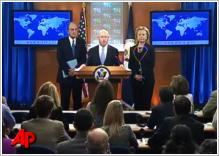A New One Year Deadline for Middle East Peace

After ignoring the festering Israeli-Palestinian conflict for most of his time in office, President Bush in January 2008 predicted the success of his belated Annapolis peace process. "I believe it's going to happen, that there will be a signed peace treaty by the time I leave office," he announced, adding, "I'm on a timetable. I've got 12 months." Now, a year and a half after Bush left the White House in failure, the Obama administration has announced a new, one year timeframe for Middle East peace. But this time, the American expectation of success is much lower and the U.S. deadline may be more of a strategy than an objective.
To be sure, there is plenty of reason for skepticism. Weakened at home and facing rejection of his preconditions, Palestinian Authority President Mahmoud Abbas grudgingly accepted President Obama's invitation for direct talks in Washington with his Israeli counterpart starting next month. Meanwhile, as former Israeli parliamentarian Yossi Bellin put it, "Netanyahu did not come to power to divide Jerusalem or find a solution to the Palestinian refugees." It's no wonder, as Politico reported, deputy envoy David Hale downplayed the 12 month target for an agreement:
Hale also deferred on the question of how hard the one-year timeline set by Secretary of State Hillary Clinton will be, describing it as a "goal" seen as "feasible" by both sides.
"Our hope and our plan [is] to work hard in order to achieve that goal," he said.
Given Israeli intransigence over the status of its West Bank settlements and Abbas' inability to secure a reference to the 1967 borders as the basis for final status negotiations, doubt on all sides about the 2011 target for a peace deal is justified.
But as the New York Times suggested, the Obama administration's 12 month deadline may be less about inking a pact than giving President Abbas political cover at home:
Daniel Levy, a former Israeli peace negotiator, said: "Abbas wanted a clear reference to the 1967 lines; instead he was given 12 months to continue making his case in the hopes that the Americans will intervene decisively." Arab diplomats offered a similar analysis.
But American diplomats, their European counterparts and Mr. Obama made the case to Mr. Abbas to return to the negotiating table without conditions, administration officials and Arab diplomats said. American officials argued that they could do more to help the Palestinian cause through direct negotiations. By setting a one-year deadline for the negotiations, Mr. Obama, who met with Mr. Abbas at the White House in June, is implicitly giving the Palestinian leader the assurance that if the two sides cannot make progress soon, the United States will step in with its own proposal outlining what a peace deal should look like.
As virtually all involved acknowledge, at this point a peace agreement between the Israelis and the Palestinians is a tall order, indeed. The same litany of thorny issues - borders, security, Jerusalem, the settlements, refugees and the right of return - remain on the table. As the Times characterized it:
There is a resigned fatalism in the air. Most analysts view the talks as pairing the unwilling with the unable -- a strong right-wing Israeli coalition led by Prime Minister Benjamin Netanyahu with no desire to reach an agreement against a relatively moderate Palestinian leadership that is too weak and divided to do so.
Nevertheless, President Obama, Secretary of State Clinton and Envoy George Mitchell believe the United States must try to break the logjam. For her part, Clinton acknowledged:
"Without a doubt, we will hit more obstacles. The enemies of peace will keep trying to defeat us and to derail these talks. But I ask the parties to persevere."
That is a far cry from Bush's bravado about his legacy building project in 2008. Throughout that spring, President Bush insisted, "I'm still hopeful we'll get an agreement by the end of my presidency." As late as May 2008, with Prime Minister Olmert facing a corruption scandal and after Israeli and Hamas forces battled in Gaza while Abbas's Fatah was locked in its own power struggle with Hamas, Bush was asked if he still thought he could achieve peace by the end of 2008. His answer? "I do, yes."
In contrast, President Barack Obama's one year deadline is not a promise to bring about the end of the Israeli-Palestinian conflict. But if all goes well (to be sure, a very big if), it may just represent the beginning of the end.


This is a good article, written in more detail. Government should be the main work is the development of the economy and improving people's lives and protecting the security of the state and people. This is the most important.
This is a good article, written in more detail. Government should be the main work is the development of the economy and improving people's lives and protecting the security of the state and people. This is the most important.